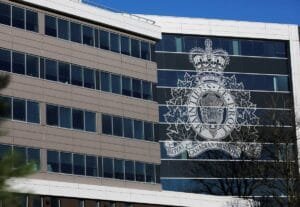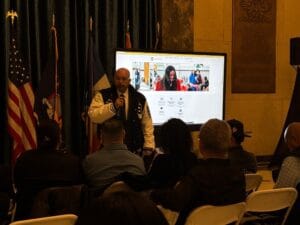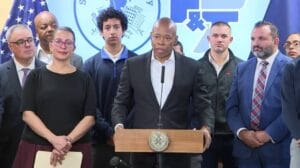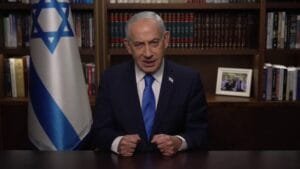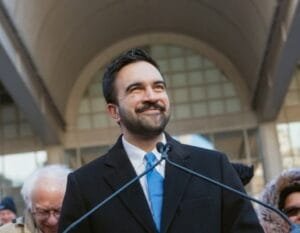“This is It” by Neil Desmond
This is part two of Neil Desmond’s short story “This is It” as published in The Parrot.

drawing by Dustin Pickering
This is part two of Desmond’s serialized short story. The first section was published recently in the New York Parrot.
“These are strange times, aren’t they Dennis? No sports to watch, no bars to go to…’

“Oh, hello, Jakes.” The detective appeared surprised to find the junior officer near his locker, or in his part of the complex at all, for that matter.
“There’s something I’ve got to talk to you about. It’s important, and we can’t have an audience. Would you be open to stopping by my place after work tonight? It won’t take long, and I have a six pack of Guinness.”
The detective was looking into his locker and appeared to be fishing around for something. “Well, I can’t turn that down,” he replied. Finally, he located the tie he’d been searching for. Turning back to Ron, he inquired, “Where’s your place again?”
**********************************
“Okay, Reverend, what’s this all about? Why did you invite me over?” Royce wondered aloud as he sat at the junior officer’s kitchen table, Guinness in hand.
“Well, Detective. There’s a thorny issue that’s got to be dealt with. I’ve spoken quietly with a number of officers about it. We believe you are best positioned to effectively deal with it. You are respected from the Mayor’s office on down, and that’s what we’re going to need to get this done.”
“All right, then, what do you got?”
“Well, Detective, it’s about bad cops. Every city of this size has them and we have them, too. After Minneapolis, indeed, after Ferguson, we believe a different approach to these guys is necessary.”
Royce sipped the stout and offered his opinion on the issue. “We’ve tried to get those guys to go straight before. They say the right things at the right time and then they go back to their old ways. You can’t fix stupid.”
“I know, Detective. That’s why we want to change our approach. We don’t want to get them to go straight anymore. We want to get rid of them altogether. We want them off the force for good.”
The detective’s eyes widened as he straightened up and sat back in his chair. A globe above the kitchen table provided light between the two men. Detective Royce took a deep breath. “Well, that’s easier said than done. The problem is that excessive force is hard to prove, unless there’s a video of it, like in Minneapolis. That’s why I wanted body cameras. The officer always says that the suspect was resisting…”
“Resisting, getting violent, creating a hazardous situation…I know. We’ve all heard it before,” Ron replied, concluding the detective’s thought. “We get that. But here’s what we’re thinking. We know who the punks are on this force. All of the good cops know who they are. If we give you that list, you could take it to the Chief. Don’t worry, we’ll sniff out personal vendettas and keep that stuff off the list. Only the true scumbags will make the list. Only the names that keep coming up over and over again. The Chief can go through their personnel files and find something on them. Maybe they said the wrong thing to a female employee at one point. Maybe there’s a technicality somewhere. Maybe they made a mistake on an expense form. Maybe they took a cruiser just outside the jurisdiction by accident one night. Then he can fire them.”
“Whoa…whoa…wait a minute,” the detective interrupted, putting both hands up as if stopping a car at a traffic checkpoint. “You want me to sell this to the Chief? You’re talking about doing an end run around the city’s contract with the police union. You’ll be setting the city up for one wrongful termination lawsuit after another. The Chief’s not going to go for that, and neither will the Mayor.”
Ron had anticipated he’d run into informed resistance from Detective Royce. Yet, when it surfaced, it still rattled his confidence for a moment. The reverend took a deep breath, then regained his composure. He realized Harold had been right about needing to bring his “A- game.”
“Hear me out, Detective. The lawsuits would come after the thugs had been fired and were no longer on the force. Nine good cops have already given me their word that they will testify against those punks once they are no longer cops. They will tell the courts and administrative boards what they’ve witnessed these thugs doing out on the street. Detective, everything has changed since Minneapolis. We can make it stick this time. We have to, Detective. Bad cops are dragging the name of good cops through the mud. They are dragging the name of the whole profession, all of law enforcement, through the mud. They are dragging our legacy through the mud.”
Ron noticed a slow change in Royce’s demeanor. The look on his face appeared more serious, more contemplative. Ron continued as the detective brought a bottle of Guinness to his lips.
“It’s got to stop. We can’t kick this can down the road anymore. There’s no more road left to kick it down. We’ve just reached a point in time when it’s no longer enough to be a good cop. This is one of those moments history when we have to be great cops. We have to step up to greatness. This is it. We have to take on the bad cops, not just the bad guys on the street. Whether it’s fair that it’s falling to us or not, that’s just the hand history has dealt us.”
The two men looked at each other silently for a few seconds. Ron noticed the detective’s adams apple, which was prominent, move up and down in his throat.
“Reverend,” Royce began in a low voice.
“Yes?” the junior officer replied.
The detective looked away, towards his right, and took a deep breath. He then turned back towards Ron. “A couple of these guys aren’t only thugs,” he advised. “They’re downright crazy. Going after them could put our lives on the line.”
Ron’s eye brows rose, again causing lines on his forehead. His hands turned the glass of beer in front of him around in slow circles.
“That may be true, Detective. But remember a few months back, when this pandemic started to hit?”
“Yes,” Royce answered, one eye brow raised.
“Those medical people, they were called upon to step up, even at risk to their own lives. They didn’t bargain for that, but it was the hand history had dealt them. There was no one else who could do it, the public had nowhere else to turn. They had to step up to the moment, and they did. They stepped up to greatness. Now history has dealt us the same hand.”
Again, the two men looked at each other in silence. Ron noticed the detective’s face had turned slightly to the left, yet his eyes continued their locked on eye contact. His stare and clenched jaw line made for a striking image under the globe light. Ron wondered briefly if the detective’s face had adopted the same expression when he’d resolved to advocate for body cameras, years earlier.
“I’ll do it,” the detective said.
*******************************
“So that’s the situation, Chief. Everything’s changed since Minneapolis. If part of the apple is rotten, then the whole apple is rotten. What happened in Minneapolis could happen here,” pleaded Detective Royce. He was concluding his pitch to Chief James Adams, a pitch that had included a concrete game plan, and had been going on for over thirty minutes.
“I don’t know, we’re talking about lawsuit after lawsuit here…” The Chief’s wariness did not come as a surprise to the twenty-five year veteran of the force. He knew he had to press on. He also knew that he – and only he – could go above the Chief if he had to. He didn’t want to do so, but he’d given Officer Jakes his word he would do whatever he had to to get this done.
“If we have to settle a couple of those suits out of court, then we can do so this time. We can do it because the public will be behind the firings this time. Even the corporate public will be behind us this time. They just want the bad cops off the force. That’s all they want. They just want the punks out.”
“Well, it seems like you’ve thought this through, Detective. Let me ask you something. Did you think the fact that I’m black would make me more likely to go in one direction or another on this? Is that what you thought?”
The chief’s question struck Royce as quite different than any question he’d been asked in his career, perhaps even in his life. It was as if the Chief were prying into his subconscious, to see what was there. Because Royce himself did not know with certainty what was there, he found himself in something of a mental pickle. He was like a baseball player caught in a run down between first and second base. But this notion only delayed the detective’s response momentarily.
“No, Chief. It’s not like that, I just think we’ve got a problem here and it’s going to blow up in our face if we don’t fix it,” he replied, in an uncharacteristically humble tone.
Throughout Detective Royce’s pitch, the Chief had been sitting forward in his chair, his elbows on his desk. Now he reclined back in his chair, moving his arms onto its arm rests. A smile came over his face. “This job’s a pain in the ass. You were smart not to take it when you had the chance,” he observed, chuckling.
The Chief’s observation, as well as the change in his demeanor, had a defusing effect and lightened the mood in the room considerably. Royce moved in his chair, placing his elbows on his knees, and leaned forward so he could look down at the floor as he chuckled and nodded in agreement with the observation. “I figure as much,” he replied.
The Chief continued his light – hearted lamentations. “The Mayor’s a closet drunk, you know that, right?” his chuckle elevating to a laugh.
“I’d heard a rumor or two,” the detective acknowledged as he continued chuckling and nodding while looking between his legs towards the floor.
“It’s always the same thing with the city council. ‘Why did you pay so much for those uniforms? Why did you buy that cruiser? What was wrong with the other one? We don’t have money for this!’ It’s just the same crap all the time.”
The sense of merriment caused by the Chief’s humorous musings had escalated to the point where both men were laughing at the thankless nature of their respective positions on the force. The anxiety Royce had felt only moments before seemed like a distant memory. But then, suddenly, he felt it returning. It occurred to him that the room had now gone completely silent. He quickly looked up at the Chief.
Chief Adams’ demeanor had, once again, changed drastically in what seemed like an instant. He almost appeared to be glairing at the detective, as if his eyes were piercing through Royce rather than at him. His teeth were clenched. The profound and sudden change in the Chief’s expression startled the seasoned detective.
“Put that list together,” Chief Adams said, in a ‘direct order’ tone of voice. “Bring me the names of the punks.”
THREE WEEKS LATER
“Why were those six police officers fired, Chief?”
Chief Adams had been approached by a local radio reporter and a sound technician as he exited city hall and descended the concrete steps which connected the street to its front doors.
“They lied on expense forms or time sheets,” he replied, curtly.
“They say those were minor, accidental errors, Chief. They say they’re going to challenge this through the union. They say they are going to file wrongful termination suits against the department.”
“They can file anything they want, but they are no longer members of this police department, and they’re not going to be again. Excuse me, gentlemen, I’ve got to get back to the station,” the Chief advised as he entered a car waiting at the curb.
***************************
Officers Mike Dickey and Sean Harris were once again playing pool in Mike’s basement.
“Hey Mike,” Sean began as he cued up his pool stick.
“What?”
“Those firings that happened the other day, they were kind of out of the blue, don’t you think?”
“So what?” Mike’s contributions to the conversation were being produced between gulps from a beer bottle.
“Well,” Sean continued, “Do you think they really got fired because they filled forms out wrong? I mean, do you think that’s the real reason?”
“Sure it is. That’s what they said over at city hall, isn’t it?”
“Well, I know that’s what they said, but I’m starting to question it. Did you notice all six of them were enforcer type cops, like us?”
“I did notice none of them were moolies. And now that you mention it, I suppose all those guys were enforcers, yes.” Mike managed to take a shot on the table between swigs of beer and the reluctant responses he was granting to Sean’s observations.
Sean applied chalk to his stick’s tip as he continued the conversation, “Well, I’ve also heard rumors.”
“Rumors?” Mike replied immediately, one eyebrow raised.
“Yeah, supposedly this is just the start. More firings are coming down and it won’t be long. Some of the names I’ve heard getting thrown around are enforcers, also. Our brand of enforcer, I mean. I haven’t heard your name or mine yet, but I’m starting to get worried about this. No straight- laced cops have been mentioned. No ‘by the book’ guys. I think the ‘forms’ story is just a cover. I think there’s a broader agenda here.” He then took a shot, knocking a ball into a hole.
Mike applied chalk to the end of his stick, but said nothing.
Sean, surprised by Mike’s silence, pressed further. He was hoping perhaps he was just being paranoid. He was hoping Mike would tell him so, that he was just being paranoid. “What do you think, Mike?”
Mike took a shot, knocking his ball in a hole. “I think we’d better straighten our laces and keep them straight,” he said.
***************************
Officer Ron Jakes fished through his locker, certain he’d left his water bottle there earlier. Officer Harold Wilkins arrived, opening his locker next to Ron’s.
“Well, Reverend. Seems like things are changing fast around here,” he noted with a smile on his face.
Ron smiled himself as he continued his search for the water bottle. “Indeed they are,” he concurred.
Harold’s curiosity was getting the better of him. “Okay, Rev, seriously. How’d you do it? How did you get the old boxer to go back in the ring for one more bout?”
Officer Jakes chuckled as he finally emerged with the water bottle, like a gold prospector who’d found his treasure at the bottom of the sand.
“Well,” the Reverend noted, good naturedly. “He lets his guard down if you can get a Guinness or two in him.”




